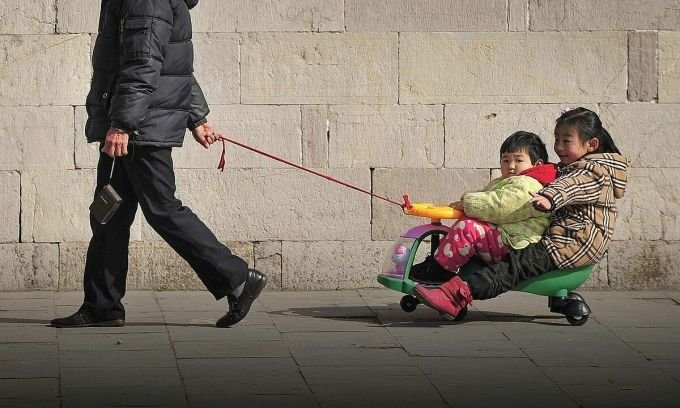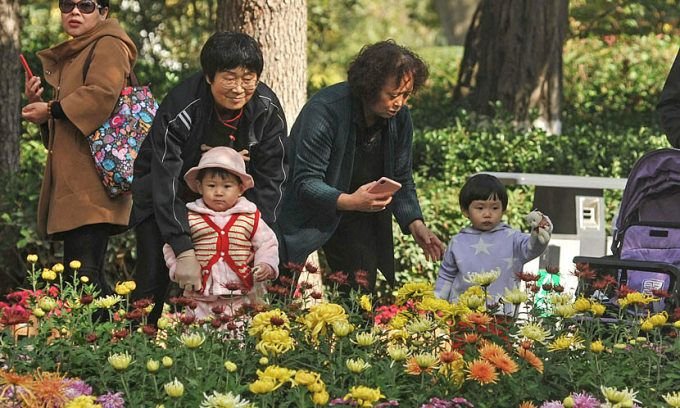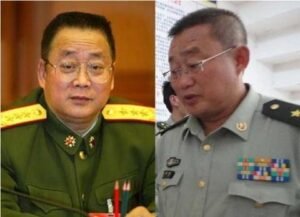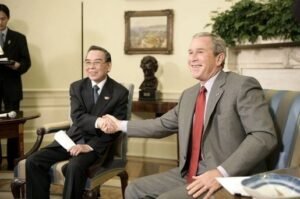
The two-child policy weighs heavily on Chinese grandparents 4
The 55-year-old woman thought to herself: `I will still run the maid company and earn a few hundred yuan every day.`
In 2014, Ms. Liu’s daughter Chongyang became pregnant for the first time.
In 2015, China abolished the one-child policy.
In the past five years, many people of her generation have fallen into similar situations.
A grandfather pulled a rickshaw and took his two grandchildren out to play in Nanjing, Jiangsu province.
For couples in urban China, taking care of children is a big problem, because usually, both partners have to work hard to pay for expensive living expenses.
According to Tang Xiaojing, a sociology lecturer at East China Normal University in Shanghai, because they grew up during the one-child policy, Chinese grandparents are often willing to sacrifice for their family and invest in their children.
The two-child policy has created new tensions in the relationship.
Tang said that most Chinese grandparents feel that taking care of their first grandchild is a `compulsory obligation` but it is different for the second grandchild.
`They also have to be with their partners,` Tang said.
When Chongyang shared his wish to have more children, Liu did not hide his disappointment.
Ms. Liu’s in-laws are eager to have another grandchild.
`She believes that women must take care of children at home so that men can go out to work,` Chongyang shared.
Being from the countryside, Chongyang’s mother-in-law did not know how to clean wooden floors or how to use an electric stove.
`She called me for help every day,` Liu Xiumei said.
From there, Liu went to Shanghai again, living with his daughter, son-in-law and two grandchildren in a 70 square meter apartment.
In the afternoon, while his nephew takes a nap, Liu watches TV or goes on social networks.
On weekends, Chongyang and his wife took their two children out all day while Liu stayed home to rest.
Liu has not yet decided whether to permanently move back to Hubei.

The elders took their grandchildren to see chrysanthemums at a park in Gansu province.
Ms. Zhao Yaping, 64 years old, did not endure like Liu.
`I’ve worked hard all my life. Now I just want to enjoy the rest of my life with my wife,` said the former teacher in Shanghai.
In 2017, seeing that his son and his wife wanted to have a second baby, Zhao warned that `having more children will make life more fun but also more bitter.`
`I meet my children on Sunday afternoon. That way, my son and his wife also have some time alone,` Zhao said.
Unable to refuse his son, Wang Huiquan accepted to take care of his second grandchild, born earlier this year.
The new baby not only made Wang stressed, but also led to conflicts between her and her daughter-in-law.
`I’m stunned every time the children scream, but my daughter-in-law doesn’t understand because she rarely feeds the children,` Wang shared.
`My hair used to be very black, now it’s almost all gray,` Wang confided.
Tang Dan, an associate professor at Renmin University of China in Beijing, said cases of older people having psychological problems due to having to shoulder too many care responsibilities like Wang are not rare.
`They take care of both grandchildren and children, so the pressure is great,` Tang explained.

A grandfather is taking care of his grandchild in Yunnan province.
Worried about the health of Chinese grandparents, some experts have called on the government to intervene.
`Thus, grandparents will be able to rest and avoid the risk of both physical and mental exhaustion,` Tao said.
She also has to take care of her two grandchildren, but Chen Xianling patiently counts the days when the children enter kindergarten.
`The neighbors don’t understand my local language. My daughter and son-in-law also like to look at their phones rather than talk to me,` Chen shared.
However, Chen was still happy when his daughter decided to have another child.
`I always wanted to have many children but government policy did not allow me to do that,` Chen said.



